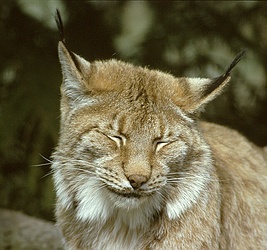Eurasian Lynx
|
|
| Eurasian Lynx | ||||||||||||||
|---|---|---|---|---|---|---|---|---|---|---|---|---|---|---|
 | ||||||||||||||
| Scientific classification | ||||||||||||||
| ||||||||||||||
| Binomial name | ||||||||||||||
| Lynx lynx (Linnaeus, 1758) |
The Eurasian Lynx (Lynx lynx) is a medium-sized cat of European and Siberian forests, where it is one of the major predators. It has yellow fur with black markings; the pattern of the fur is variable: lynxes with heavily spotted fur may exist close to conspecifics with plain fur.
Lynxes prey on hares, rodents, foxes, and even roe deer.
Once this cat was quite common in all of Europe. By the middle of the 20th century it had become extinct in most countries of Central and Western Europe. In recent times there have been successful attempts to reintroduce the lynx to forests.
Status of the Eurasian Lynx in various countries and regions:
- France: Exterminated about 1900, but now reintroduced to the Vosges and Pyrenees.
- Germany: The lynx was exterminated in 1850. It was reintroduced to the Bavarian Forest and the Harz in the 1990s. In 2002 the first birth of wild lynxes on German territory was announced: a couple of lynxes in the Harz National Park had given birth to the young.
- Switzerland: Extinct in 1915, reintroduced in 1971. From here lynxes migrated to Austria and Slovenia, where they had been exterminated as well.
- Poland: There are about 1000 lynxes in the Bialowieza Forest and the Tatra mountains.
- Carpathian Mountains: 2200 lynxes in this mountain range, which extends from the Czech Republic to Romania; largest contiguos lynx population west of the Russian border.
- Balkan peninsula: In Serbia, Macedonia, Albania and Greece there are altogether 50 lynxes; the nearly extinct population may be increased by lynxes immigrating from Slovenia.
- Scandinavia: There are about 2500 lynxes in Norway, Sweden, and Finland. Scandinavian lynxes were close to extinction, but increased again due to protection. In the meantime hunting for lynxes has been legalised again.
- Russia: More than 90 % of all Eurasian Lynxes live in the forests of Siberia. They are distributed from the western borders of Russia to the Pacific island of Sakhalin.
- Central Asia: The lynx is also native to the Chinese provinces of Gansu, Qinghai, Sichuan and Shaanxi, as well as to Mongolia, Kazakhstan, Uzbekistan, Turkmenistan, Kyrgyzstan, and Tajikistan.
Subspecies
- Lynx lynx lynx, Scandinavia, Central and Eastern Europe, western Siberia
- Lynx lynx dinniki, Caucasus
- Lynx lynx isabellinus, Central Asia
- Lynx lynx koslowi, central Siberia
- Lynx lynx sardiniae, Sardinia, extinct
- Lynx lynx stroganovi, Amur region
- Lynx lynx wrangelli, eastern Siberiabg:Рис
de:Eurasischer Luchs et:Ilves eo:Linko fr:Lynx d'Eurasie it:Lynx lynx nl:Euraziatische lynx pl:Ryś (zwierzę) fi:Ilves sv:Lodjur uk:Рись
